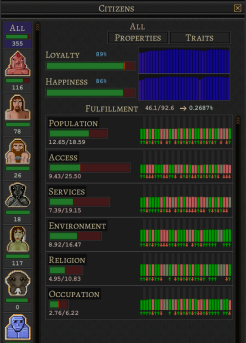Happiness: Difference between revisions
No edit summary |
No edit summary |
||
| Line 4: | Line 4: | ||
The player must make sure their settlement satisfies as many needs and wants as possible. The three races in the game: [[Cretonians]], [[Dondorians]] and [[Cantors]] all have different general preferences, and the player must cater to all of them. The more citizens that enter the settlement, the higher their expectations, meaning the player must introduce more and more buildings, services and much-needed resources. | The player must make sure their settlement satisfies as many needs and wants as possible. The three races in the game: [[Cretonians]], [[Dondorians]] and [[Cantors]] all have different general preferences, and the player must cater to all of them. The more citizens that enter the settlement, the higher their expectations, meaning the player must introduce more and more buildings, services and much-needed resources. | ||
[[Slaves]] are the only variant of citizens that aren't factored into happiness. Instead, the loyalty of slaves | [[Slaves]] are the only variant of citizens that aren't factored into happiness. Instead, the loyalty of slaves depend on how submissive they are. | ||
==Statistics== | ==Statistics== | ||
| Line 39: | Line 39: | ||
Note that the access of specific races can be enabled/disabled for each type of service in the happiness GUI. | Note that the access of specific races can be enabled/disabled for each type of service in the happiness GUI. | ||
Eating Services - The quality and accessibility | Eating Services - The quality and accessibility of [[eatery|eateries]] and [[canteen]]s. | ||
Sleeping Services - The quality and accessibility of [[flathouse]]s and [[dormitory|dormitories]]. | |||
Hygiene Services - The quality and accessibility of [[bathhouse|bathhouses]] and [[well]]s. | |||
Drinking Services - The quality and accessibility of [[tavern]]s. | |||
Other Services - The quality and accessibility of [[hearth]]s and [[lavatory|lavatories]]. | |||
[[Category:Gameplay elements]] | [[Category:Gameplay elements]] | ||
Revision as of 00:07, 3 June 2021

Happiness is the measure of well-being and positivity of citizens in a settlement. Happiness being high enough is the sole factor of immigrants moving in, but having it too low will have citizens leave. There are roughly 11 factors that contribute to happiness: population, work, food, service, access, environment, equipment, battle, needs, afterlife and storage.
The player must make sure their settlement satisfies as many needs and wants as possible. The three races in the game: Cretonians, Dondorians and Cantors all have different general preferences, and the player must cater to all of them. The more citizens that enter the settlement, the higher their expectations, meaning the player must introduce more and more buildings, services and much-needed resources.
Slaves are the only variant of citizens that aren't factored into happiness. Instead, the loyalty of slaves depend on how submissive they are.
Statistics
The two biggest factors of happiness are fulfillment and expectations. These two can be dissected into the aforementioned 11 statistics.
Population
Population - The amount of subjects living in your city. Noble - The noble of nobles of this species. Emigrant - Subjects leaving your city! Immigrant - An immigrant is someone that has immigrated to your city. They will remain immigrants for about a year. Trapped - Trapped subjects are unable to reach the throne due to something blocking them. They will not function until you clear a path from them to the throne. Age - The subject's age in years. Majority - The percentage of this species contra your total population. Law - How lawful your city is. Improved by building catching criminals and process them in your law rooms. Mercy - How criminals are treated. Based on how many of them are executed. Slaves - The amount of enslaved of the same species. Other Slaves - The amount of enslaved of all species.
Work
Employed - The amount of subjects currently employed. Work Skill - Once your subjects get employed in a room, their work skill will increase with time. This skill greatly improves productivity. Work Time - Progress of current work shift. Subject try to work for the better part of the day. Will reset when shift has ended. Retirement Age - When a subject has worked half of its life expectancy, it can retire. A decree of 0% will have your subjects work their whole lives. 100% and subjects will retire once half their average life-span has been reached. The player can change the retirement age target. Fulfillment - How this subject feels about its current work situation. Different species like different workplaces. You can set the order of how your workplaces should be filled in the species tab.
Starving
Starving - If a subject can't find food when hungry, it will eventually start to starve. Starving subjects will refuse to work, instead they will spend all their remaining effort to find something to eat. Food Preference - Each race has its own preference in food. If you have a kitchen, subjects will go there and try to find the food it prefers to eat. Food Days - How long the food in your stockpiles, kitchens and feast halls will last. Food Rations - How many pieces of food each subject is allowed when they eat. Rations more than 1 can only be extracted from an eating service. Target food rations can be customized. Drink Rations - How many drinks subjects are allowed when thirsty. High rations will lead to more drunkenness and decrease health.
Services
Note that the access of specific races can be enabled/disabled for each type of service in the happiness GUI.
Eating Services - The quality and accessibility of eateries and canteens. Sleeping Services - The quality and accessibility of flathouses and dormitories. Hygiene Services - The quality and accessibility of bathhouses and wells. Drinking Services - The quality and accessibility of taverns. Other Services - The quality and accessibility of hearths and lavatories.